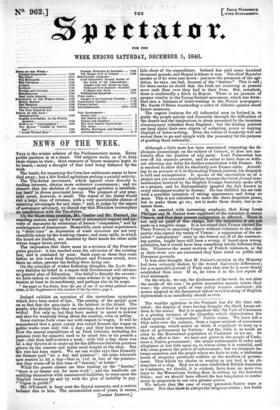Although a little more has been announced respecting the di-
plomatic proceedings on the subject of Cracow, it does not ma- Although a little more has been announced respecting the di- plomatic proceedings on the subject of Cracow, it does not ma- terially alter the position of any party. Lord Palmerston has sent off his separate protest, and he seems to have done so with- out allowing any delay for further consultation with France. He is resolved to show that he absolutely sets France aside. Accord- ing to an account of it in the leading French journal, his despatch is cold and unimpressive. It speaks of the annexation as of a
project not yet executed ; doubtless because the latestfornid com-
munication received by the English Foreign Secretary spoke of it as a project, and he diplomatically ignored the fact known to every newspaper-reader in Europe. He has fulfilled his set task with a manifest intention of saving appearances and doing no more. This is not calculated to make the three despoilers pause, but to make them go on; not to make them doubt, but to re- assure them.
It is asserted with increasing. emphasis, that King Louis Philippe and M. Guizot were cognizant of the intention to annex Cracow, ani thataheir. present *14E11101°n is affected. There is not only no proof of this charge, biti the -itoeutiation is not ye* made in a tangible shape. It is not stated that France abetted the Three Powers m annexing Cracow without reference to the other
parties who signed the treaty of Vienna : a suppression of the so- called " independent" state by the formal act of all the contract- ing parties, might have still been a wrong, if based upon wrong principles, but it would have been something totally different from this. Whatever the secret motives of French statesmen so far as their overt acts are concerned they have acted on public and European grounds.
It was once thought that M. Guizot's position in the Ministry had been seriously shaken by the recent diplomatic differences ; but a respectable journal of Paris says that now he is more firmly established than ever. If so, he owes it to the low repute of rival statesmen.
On the whole, we say, the disclosures of the week do not alter the merits of the case : its public necessities remain where they were ; the obvious path of true policy remains unaltered; the course adopted in the fantastical spleen or self-seeking of English diplomatists is as manifestly absurd as ever.


































